Alarming Covid surge cools Russia’s football fever
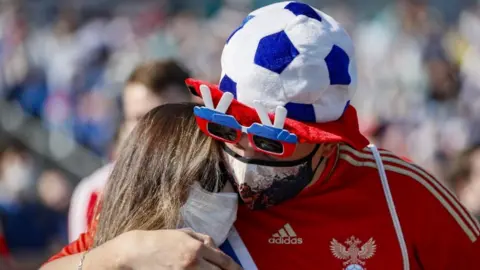 EPA
EPARussia is facing a sharp increase in the number of new Covid-19 infections, while at the same time hosting European Championship football matches.
The mayor of Moscow has spoken of an "explosion" of cases and authorities say the numbers are close to last year's peaks. Twenty million people live in the Moscow region and compulsory vaccinations have now been ordered for service sector staff such as catering and public transport.
No Euro 2020 matches are taking place in Moscow itself, but a special fan zone with a big screen has now been closed.
St Petersburg, which is hosting six matches, is facing a steep rise too. Doctors across Russia have seen a 30% increase in cases in the past week, say officials, amid a significant spread in the Delta variant that was first identified in India.
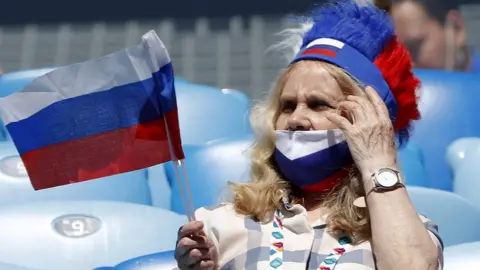 Reuters
ReutersThis need not have happened. Russia was one of the first countries to announce the development of a Covid vaccine and mass vaccinations began last December. But uptake of vaccinations has been poor.
A variety of restrictions have been imposed across Russia's vast territory, including bans on mass gatherings, reduced capacity at entertainment venues and greater enforcement of face coverings.
How serious is the situation?
Moscow is now seeing infection numbers as high as December last year and hospital admissions in the capital are up 70% on last week.
Some experts have warned the city could run out of Covid beds in two or three weeks.
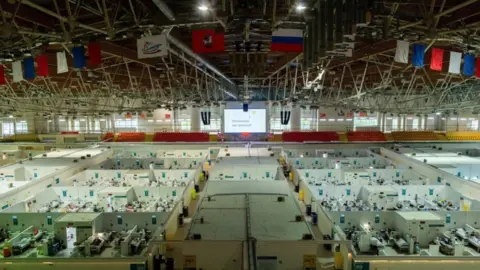 Denis Grishkin/Moscow News Agency via Reuters
Denis Grishkin/Moscow News Agency via ReutersThe capital's chief Covid doctor, Denis Protsenko, admitted the situation was difficult but said the healthcare system was adapting to the rapidly changing conditions "in a flexible manner".
Mayor Sergey Sobyanin stressed that the entire region was "at the crossing of many roads".
"Moscow is suffering the most frightening blows of the epidemic. That's why we need reliable defence against the disease, against thousands of new deaths among Muscovites," he wrote on the city's website.
Under the new defence plan for the service sector, it is now obligatory for state bodies and private businesses to ensure at least 60% of staff in public-facing roles are vaccinated within a month. That includes staff at cafes and restaurants, public transport, all entertainment venues, beauty salons and gyms.
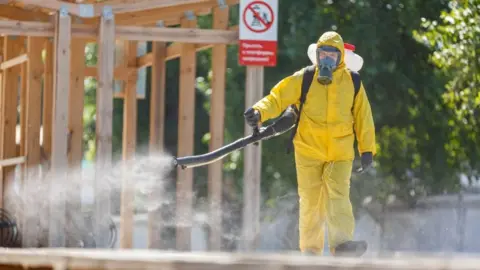 Russian Emergencies Ministry via Reuters
Russian Emergencies Ministry via ReutersHas Russia been too lax?
Russian health experts have been sounding the alarm for months, warning that the more infectious Delta variant would reach Russia eventually and spread rapidly.
Russia has not had a national lockdown and restrictions have always varied regionally.
The official Coronavirus HQ death toll stands at nearly 130,000. But Russia's Rosstat statistics agency said this month that 270,000 people had died of confirmed or suspected Covid-19 by the end of April.
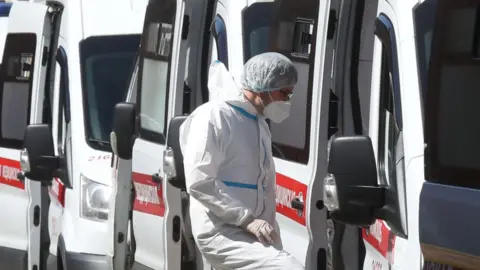 Getty Images
Getty ImagesMoscow has had some of Russia's toughest restrictions, including "non-working" weeks to keep public transport numbers down. But experts say that encouraged more mixing in public places.
Was Russia wise to host Euro 2020?
Russia is one of the 11 host countries, and Sweden play Slovakia at the St Petersburg Arena on Friday afternoon.
Some doctors have voiced concerns that fans from abroad and Russia's regions will be mixing in the city, spreading the Delta variant even faster.
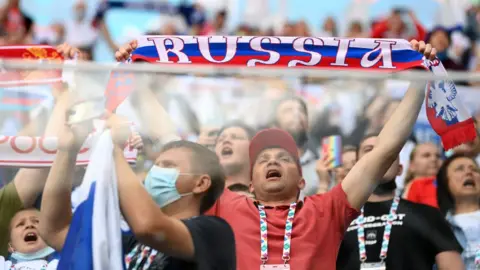 Pool/Getty Images
Pool/Getty ImagesThere has been a small cut in the hours for food sales in fan zones.
But authorities have to balance the need to revive the economy and tourism with halting a new Covid wave.
What went wrong with vaccinations?
Russia has been vaccinating people since the end of last year with its aptly named Sputnik V. It has developed and registered two more vaccines since.
President Putin and other politicians and celebrities went public when they were vaccinated, and yet the numbers have been sluggish.
Only 12.8% of Russians had received a single dose by 16 June, and 9.9% were fully vaccinated, according to statistika-vaccinacia.ru, which collates regional figures.
Those numbers have begun to pick up, but are still far below levels in the US, UK, the rest of Europe, Israel and elsewhere.
Why the slow uptake?
One May opinion poll suggested 40% of Russians would refuse vaccination under any circumstances, and just over 20% said they would only do so if it meant they could not travel abroad.
Sociologist Denis Volkov of the Levada centre, which conducted five polls in the past year, believes many Russians appear to have adopted a wait and see strategy. He says they may be looking for more information about the safety and effectiveness of Russian vaccines, including from abroad.
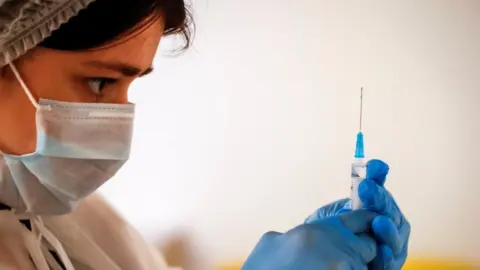 Reuters
Reuters"First, people said that they didn't want to get vaccinated because it's a new disease and the vaccine was developed too fast," he said.
Then, half said they did not trust Covid numbers: "Some think the figures are underestimated, some that they are overestimated to sell more face masks and disposable gloves."
What next?
The authorities want the vaccination campaign to speed up. President Vladimir Putin's spokesman Dmitry Peskov admits the rollout is going badly. But, asked whether Russia could see compulsory vaccinations for the entire population, he said "this course of action was not considered at present".
Reports from across Russia speak of employees being threatened with suspension from their jobs until they get vaccinated.
Hardline leader Ramzan Kadyrov has gone as far as to warn people in the southern republic of Chechnya that the authorities will be "forced to turn to harsh restrictive measures" unless uptake improves.
With additional reporting by Oleg Boldyrev and Olga Shamina.


